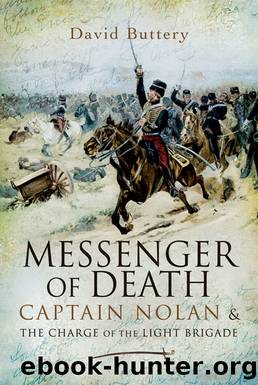Messenger of Death: Captain Nolan and the Charge of the Light Brigade by Buttery David

Author:Buttery, David [Buttery, David]
Language: eng
Format: epub
ISBN: 9781844684779
Publisher: Pen & Sword
Published: 2013-06-09T16:00:00+00:00
Louis was certainly forthright in his opinions but it must be borne in mind that these revelations were written in a private diary never intended for publication. Had he been able to write up these notes for a book on the campaign, he would certainly have toned down his criticism of individuals or possibly modified his views with the benefit of hindsight. Even so, his journal gives valuable insight into his views immediately after the Alma.
However, it was true that cavalry had achieved results disproportionate to their numbers in the past, especially against a disrupted or retreating enemy. At the Battle of Jena 1806, Marshal Murat’s cavalry had done just that while chasing the defeated Prussian Army from the battlefield and beyond, inflicting great losses and capturing hundreds of demoralized soldiers. Though the Russian cavalry had not been committed and must have been relatively fresh, they had seen their army forced into retreat and, since many of them were irregular Cossacks, their capability for opposing a determined body of regulars was debatable. It was possible to argue the matter either way, but Raglan had decided that, lacking sufficient infantry support, he would take no chances. After all, the Allies lacked local intelligence in a foreign country, faced an indeterminate number of the enemy and were encountering difficulties securing forage and water. The cavalry were under strength and Raglan depended on their services so he was wise not to risk them. It is easy to imagine the criticism he would have faced if he had lost the only cavalry available to him at the outset of the campaign.
The Battle of the Alma may not have been a crushing victory but it marked a crucial point in the campaign. In strategic terms, the Russians had lost little by opposing the march since they still had Sevastopol. Though it was true that they had suffered 5,000 casualties and a blow to their morale, they possessed enormous manpower and to some extent could afford the sacrifice. In contrast, the Allies could not afford a defeat at this stage and even a temporary reverse or an engagement drawn out over several days would have created difficulties. They were on a hostile coastline, without sufficient shelter and reliant on supply by sea. A defeat or a crippling blow to the Allies’ morale might have resulted in a laborious retreat back to Kalamita Bay and a difficult embarkation that could have ended in disaster. Instead, the Allies had received a boost to their spirits and could advance on their objective.
Although Raglan’s leadership had not been inspired, he had kept his nerve and won a convincing victory against a strong defensive position. It had been an old-fashioned frontal assault but he, his command system and the army had prevailed, his brave but reckless ‘forward reconnaissance’ notwithstanding. In contrast, Menshikov’s performance had been poor. Despite the advantage of large numbers of troops and a strong position, he had panicked, riding from one threat to another when he should have
Download
This site does not store any files on its server. We only index and link to content provided by other sites. Please contact the content providers to delete copyright contents if any and email us, we'll remove relevant links or contents immediately.
| Military | Political |
| Presidents & Heads of State | Religious |
| Rich & Famous | Royalty |
| Social Activists |
Waking Up in Heaven: A True Story of Brokenness, Heaven, and Life Again by McVea Crystal & Tresniowski Alex(37808)
Empire of the Sikhs by Patwant Singh(23084)
We're Going to Need More Wine by Gabrielle Union(19046)
Hans Sturm: A Soldier's Odyssey on the Eastern Front by Gordon Williamson(18590)
Leonardo da Vinci by Walter Isaacson(13336)
The Radium Girls by Kate Moore(12028)
Tools of Titans by Timothy Ferriss(8393)
Educated by Tara Westover(8053)
How to Be a Bawse: A Guide to Conquering Life by Lilly Singh(7486)
Permanent Record by Edward Snowden(5846)
The Last Black Unicorn by Tiffany Haddish(5635)
The Rise and Fall of Senator Joe McCarthy by James Cross Giblin(5280)
Promise Me, Dad by Joe Biden(5153)
The Wind in My Hair by Masih Alinejad(5095)
A Higher Loyalty: Truth, Lies, and Leadership by James Comey(4960)
The Crown by Robert Lacey(4814)
The Iron Duke by The Iron Duke(4354)
Joan of Arc by Mary Gordon(4109)
Stalin by Stephen Kotkin(3965)
